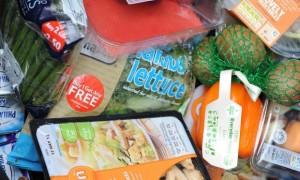French MPs Vote to Ban Supermarket Waste


FRENCH MPs have unanimously voted to ban supermarkets from destroying food …
Last week in parliament, French MPs have voted unanimously in favour of a bill to ban supermarkets from destroying food that is still fit for consumption. The anti-wastage amendment was approved in the National Assembly as part of a broader law on energy and the environment after it was disclosed how much edible food was being discarded by supermarkets.
As MPs united in a rare cross-party consensus, the centre-right deputy Yves Jégo told parliament: “There’s an absolute urgency – charities are desperate for food. The most moving part of this law is that it opens us up to others who are suffering.”
There has been cases where some supermarkets were throwing food away into large wheelie bins and then pouring bleach over the contents to make sure it was unfit for consumption, and discourage people searching through bins for food.
With the implemention of this amendment, all Supermarkets and hypermarkets larger than 400m² or more will have to sign contracts with charities and charitable associations and donate food once it is taken off the shelves, by July next year or face penalties including fines of up to €75,000 (£53,000) or two years in jail.
The head of the French federation for commerce and distribution, Jacques Creyssel, said it was a mistake for the law to only target big stores, which he said represent 5% of total food waste. He said hypermarkets were among the biggest donors to food banks and 4,500 stores already had agreements in place with charities.
The law will also introduce an education programme about food waste in schools and businesses. It follows a measure in February to remove the best-before dates on fresh foods.
The measures are part of wider drive to halve the amount of food waste in France by 2025. According to official estimates, the average French person throws out 20kg-30kg of food a year – 7kg of which is still in its wrapping. The combined national cost of this is up to €20bn.
Enjoyed this? Get the week’s top France stories
One email every Sunday. Unsubscribe anytime.



Food waste is a lose-lose situation for the environment, the struggling families in today’s tough economy and for the food retailers.
Fortunately, there are new ways to avoid unsold food waste.
The new open GS1 DataBar barcode standard enables new food waste reduction applications that offer relevant, environmentally friendly and personalized fresh food deals.
An example of such an application is the “End Grocery Waste” App. This GS1 DataBar based application encourages efficient consumer shopping behavior that makes fresh food affordable for all families, maximizes grocery retailer revenue, and effectively reduces the global carbon footprint.